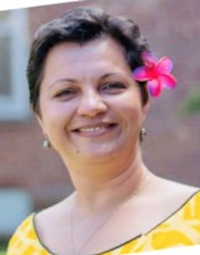By Sri Krishnamurthi
While some women at the University of the South Pacific’s 14 campuses found working from home enjoyable during the covid-19 pandemic, others felt isolated, had overwhelming mental challenges and some experienced domestic violence, a Pacific survey has found.
Titled “University Women Remote Work Challenges”, the survey was funded by the Council of Pacific Education (COPE) and was supported by the Association of the University of the South Pacific staff (AUSPS)
The research report, released last month, was conducted by Dr Hilary Smith (an honorary affiliate researcher at the Australian National University and Massey University) for the women’s wing of AUSPS.

“This survey confirms that many of our university women had support from their family networks while on Work From Home, but others were left feeling very isolated,” said Rosalie Fatiaki, chair of the AUSPS women’s wing.
“Women with young children had a lot to juggle, and those who rely on the internet for work had particular frustrations — some had to wait until after midnight to get a strong enough signal,” she said.
Around 30 percent of respondents reported having developed covid-19 during the Work From Home periods, and 57 percent had lost a family member or close friend to covid-19 as well as co-morbidities.
In the survey there was also evidence of the “shadow pandemic” of domestic abuse and although the reported levels were low, it was likely the real incidence was much higher, said Dr Smith.
‘Feelings of shame’
“That was because of the feelings of shame (reporting domestic violence). In the Pacific Islands families and communities tend to be very close-knit groupings,” Dr Smith said.
Only two of the 14 USP campuses in 12 Pacific countries avoided any covid-19 closures between 2020 and 2022 — the shortest closure was two days in Tokelau and the longest at the three Fijian campuses of Laucala, Lautoka and Labasa lasting 161 days.
There had been no cases on the Tuvalu campus until the second quarter of this year.
“For women who had older children they said they enjoyed the time with their families,” Dr Smith said.
“And it was more difficult for those with young families,” she said.
She stressed the importance of being careful with the survey in relation to domestic violence.
“With this kind of survey, we had to be a little bit careful. We can’t say we got evidence of how much there is because it is a very tricky thing to survey and especially in this kind of survey,” Dr Smith said.
‘Sensitive issue’
“And because it is a sensitive issue and people tend not to identify and it is something that people tend to be ashamed about pretty much.
“The survey was totally confidential, and we set it up so no one would who the respondents were.
“It was impossible to find out through the ANU programme we used.
“But the fact people did give some evidence then I think that we know that it is actually quite significant, and we assumed that the prevalence was quite higher.”
She said that she was not saying there were more incidents, but from media reports, particularly in Fiji, she had suspicions that it was higher than reported in the survey.
“We were responding to the fact that there were other news reports in Fiji we referenced, and there has been the other report by the UN (United Nations) women about it,” she said.
The report “Measuring the Shadow Pandemic – violence against women during Covid-19” was released by the UN in December 2021 and the Violence Against Women Rapid Gender Assessments (VAW RGA) were implemented in 13 countries spanning all regions — Albania, Bangladesh, Cameroon, Colombia, Côte d’Ivoire, Jordan, Kenya, Kyrgyzstan, Morocco, Nigeria, Paraguay, Thailand and Ukraine.
There was general support of national statistical offices (NSOs) or national women’s groups and funding from the policy and Melinda Gates Foundation, which found an incidence of 40 percent of reported domestic violence.
‘There in Pacific”
“So, we weren’t saying that it was more than in other countries, but we were saying it was there in the Pacific.
“It could be more, or it could be less but because the evidence had been already highlighted in Fiji, we were just picking up on that.”
AUSPS had specifically asked for it to be followed up because of “widespread murmuring” that domestic violence was occurring.
“My colleagues at USP had indicated they wanted to follow it up because they had heard that it was an issue for some women,” Dr Smith said.
In her recommendations she had suggested counselling for women and a safe space on campus, but she was unsure if it would be acted on.
Limited counselling
There was limited counselling available already and some had suggested that it should be done through religious denominations, she said.
She said internationally people had struggled with mental health issues during the pandemic, so it was common to all communities.
“There was a relatively high incidence in Fiji, and we reported the findings from the survey,” Dr Smith said.
Among the recommendations for support during isolation was the setting up of a helpline and regular calls from senior personnel and support staff.
She said even if this pandemic had passed there were other events like natural disasters, politics, and wars to be mindful of.
“Human-made or nature-made or the prevalence of other pandemics, we are basically saying the university should be prepared,” Dr Smith said.
This post was originally published on Asia Pacific Report.